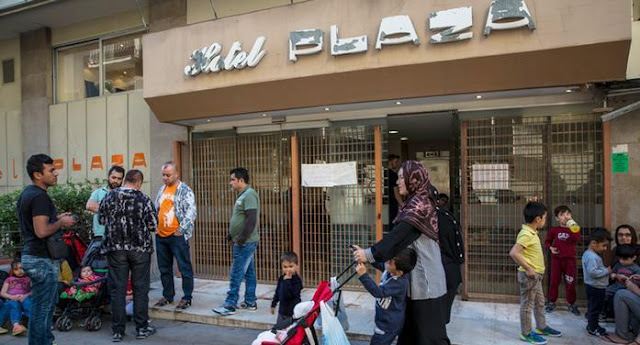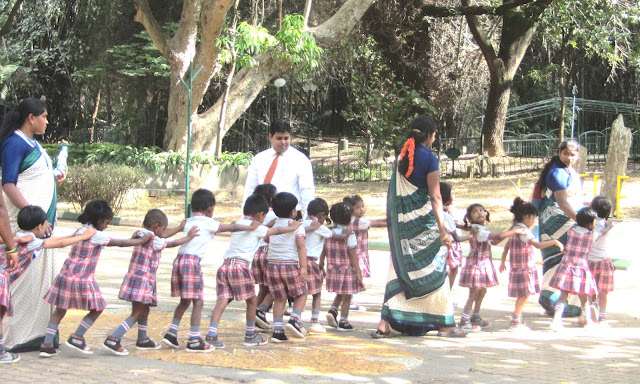 |
| Someone's "Home Sweet Home" |
The apartment building in the next street has basement rooms. It’s not entirely below ground: I suppose the basement floor level is about 4 feet below the pavement, with steps leading down from the street. There are iron bars set into the wall at street level, which allow light in, but it is unglazed and has a makeshift curtain of an old piece of faded fabric which keeps out some of the dust and fumes churned up by the traffic. If I peep in as I pass, I can see a clutter of oddments of furniture, with mismatched cushions and a small table lamp with a feeble, low-wattage bulb that gives out yellow light. Sometimes an old woman is sitting on lightweight sun-bed, such as one might take camping or to the beach, and there is an old couch with sunken cushions, that probably serves as her husband’s bed at night. It is very dim and reminiscent of the room-set in a museum, displaying “how poor people used to live.”
Except that there would have been no flickering old television, no gaudy nylon and polyester, and no shaggy rug with the pile caked into odd lumps. But how could one keep clean a room that is level with the gutters of a dirty, dusty street? There are three similar adjacent facades, but those gratings are shuttered, the doors are boarded and there is no sign that these basement rooms have been occupied in at least the past decade or more.
Throughout this part of Athens, there are big galvanised wheely-bins for refuse, parked at 100-yard intervals along the roadside, with an occasional blue bin which is theoretically for recyclables.
In practice, I suspect that anything that ends up in any bin goes to landfill while anything that could be recycled is scrounged, hoarded and sold to scrap merchants by an army of bin-divers. There is an extremely untidy protocol about garbage in Athens.
It seems that people only put into the bin things that could have no value to those who make a living by recycling. The area of road and pavement around the bin is piled high on a daily basis with furniture, carpets, curtains, clothing and bags of plastic bottles: anything that might fetch a few euros or a few cents.
Yesterday, a man was cross-legged on the pavement, assiduously unscrewing the hinges, handles, and locks from a discarded internal door, to sell as scrap metal, while a woman was sorting through a heap of clothes and putting children’s items to one side. Further down the street, a man with a Vespa 3-wheeled pick-up was roping down a stack of flattened cardboard cartons that towered high over me as I passed. These would go to the mill to be pulped and – inevitably – remanufactured into more cardboard cartons.
Everything is filthy. The pavements are cracked and the kerbs are uneven. By the pick-up point near the Metro station, the gutters overflow with cigarette butts emptied out from car ash-trays by drivers, while they wait to pick up partners coming home from work downtown. In a side street you can come across the empty shell of a once-magnificent, fin-de-siècle town-house. That’s depressing, but even more so is the empty shell of a brand-new hotel nearby, that has never opened.
Some streets remind me of Indian cities like Bangalore, or Cochin, where investment has poured into gleaming new developments, but no one has thought to make provision for a maintenance budget. For the first months, the marble gleams and the chromium shines, then the dust and grime gradually take over, and the developer’s dream quickly loses its sparkle.
 |
| Athens Metro below ground |
That’s how it is in the Athens Metro. The stations and rolling stock of line 2 are spotless, but as you come up to street level you see the grime on the stairs, the escalators, and the lifts. How tragic to build a new Metro line where every single station is totally wheelchair accessible, and then to forget to budget for cleaning the lifts, so that the efficient glass cages are gradually becoming grubbily opaque.
 |
| Athens downtown - street level |
When the Wednesday street market closes in late afternoon, the scavengers keep a few yards ahead of the bin-men. There are plenty of oranges, onions and potatoes to be scrounged from the gutters, and even the occasional tray of peaches or tomatoes; but who are these people?
There is a family of Syrian refugees, the children scampering up and down the pavement, enjoying the game of collecting unsold free food. Meanwhile, the expressions on the parents’ faces show their dismay at the shame of being reduced to this. Father wears quality clothes and looks professional; when will he be employed? They seem to be wondering how long it will be before they can get back to living a normal life.
The lady from the basement apartment – if one can use such grandiloquent language for an urban hovel – goes home with a magnificent cauliflower and a bag of carrots. An irritated horn toots; it is a gleaming Mercedes Sports that impatiently nudges the woman and the refugees out of the way.
Cheek-by-jowl is the story of life in Athens. There are the middle-class ladies out shopping with their friends, who see their world covered in grime and un-cared-for, and there are the homeless refugees who squat under the trees in Victoria Square by day and go back to the tents on the tarmac somewhere to sleep at night. We used to bring them a hot meal every evening, but the police stopped that six weeks ago. They never gave any reason, but we suspect that the municipality was desperate to prevent the situation becoming normalised.
 |
| The fortunate ones stay at the Plaza, courtesy of an Anarchist group |
The fortunate few are in the Plaza Hotel, which has been commandeered by the anarchists, and is fast developing as a self-governing community. There is plenty of food, education and playgroups, language classes and, yesterday, even a concert of traditional Persian music.
But there is limbo. Nobody knows how long this will continue, and nobody knows how it will end. There are tens of thousands of people in search of a better life, while the EU fails miserably to offer any kind of solution. And still they arrive; - or fail to arrive; - and drown.
In Britain, UKIP displays a huge poster of an army of tough young men of Middle-Eastern and African origin, marching menacingly onwards. In Greece, I see whole families with women and children, who have lost their homes and their entire community has been flattened. . . and the world looks the other way.
Does anyone have the courage to ask WWJD? I’m afraid the religion of the world today is selfish consumerism. That is what the governments encourage and - worse - that is what we teach our children.
I have written before that I am ashamed of my government. By contrast, I am proud of my people. There are so many twenty-somethings who have put their lives on hold while they come to Greece and try to help solve the problem. Many are from UK and Northern Europe, but they come from all around the world. Many who don’t come in person raise large sums of money.
One amazing woman with whom I have worked a little here in Athens posted this on Facebook. It explains the attitude and the frustration:
Thessaloniki airport.
I'm sure I'm not the first, and won't be the last, to sit here and seriously consider my life decisions that got me here, and that are pulling me away.
I've helped start up and been coordinating a project getting food to 10,000 refugees a day. People looking for safety and ending up in disused, falling down warehouses, being given appalling food from the military, with no hope of the situation improving soon.
It's going to take years to relocate the 50,000 refugees in Greece. What can follow this? How can you do anything but more of the same once you've been here, seen it, and been a real part in making it a bit better?
Every new “problem” is seen as a challenge and an opportunity. When Samos hospital was running out of syringes last week, the message went out on Facebook, and someone, somewhere air-freighted boxes of syringes that arrived the next day. That is one tiny example of the attitude and achievements of an amazing army of young people who are passionate about putting things right.
So, please, next time you see someone collecting for Oxfam, or Doctors without Borders (MSF) or UNICEF, don’t reach for your small change; reach for your wallet.















































